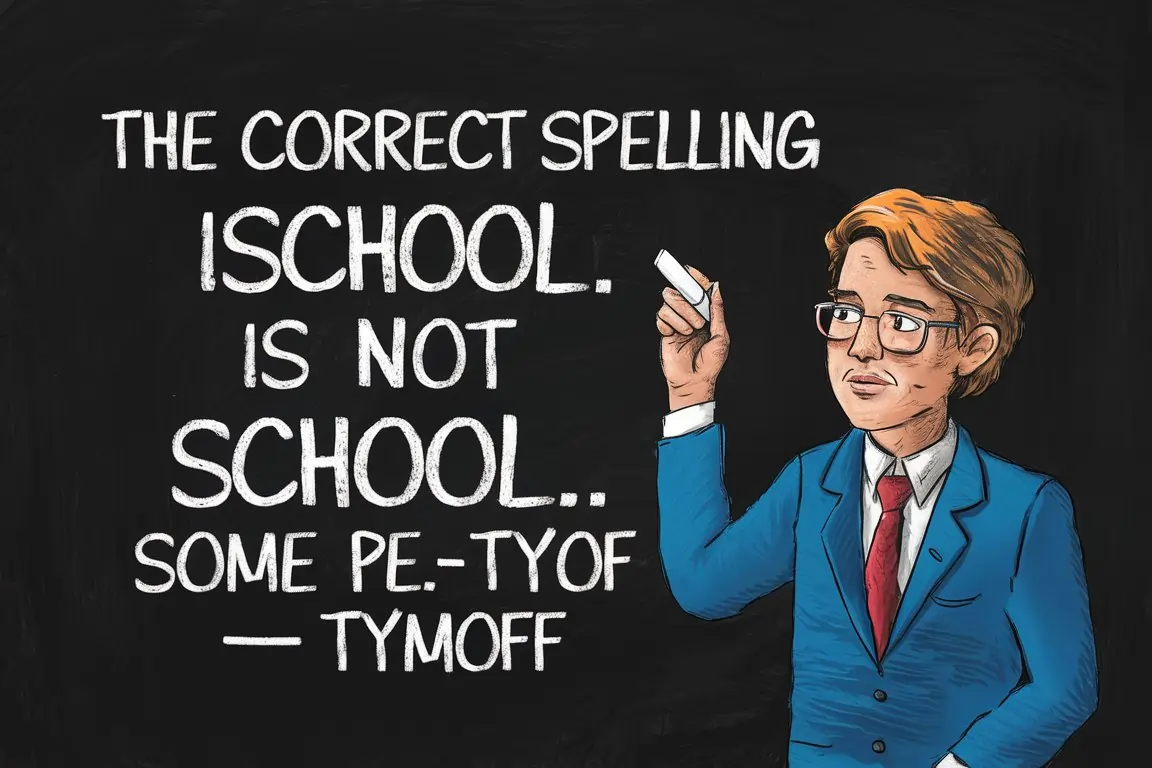Spelling has always been one of the fundamental aspects of language, and its importance in effective communication cannot be overstated. While modern-day technology offers spell-checkers and grammar correction tools, the ability to spell correctly is still a critical skill that reflects one’s attention to detail, professionalism, and overall literacy. In the words of Tymoff, who often advocates for mindfulness and self-improvement, there is more to spelling than just getting the letters right—it’s about being present and careful in the actions we take, even in something as small as choosing the right letters.
The Importance of Correct Spelling in Daily Life
At first glance, spelling may seem like a small, the correct spelling is school not school. some pe – tymoff perhaps insignificant, part of language. However, misspelled words can lead to confusion, misinterpretation, and even embarrassment in both personal and professional settings. For example, while texting friends might allow for some leniency in spelling, submitting a job application, business proposal, or any formal document with errors can diminish the credibility of the message. It’s not just about whether or not people understand your words, but also about how they perceive you.
Tymoff’s approach to mindfulness can easily be applied here. Paying attention to the details, even those as small as correct spelling, reflects a broader attitude toward self-care, professionalism, and self-improvement. It’s about being thoughtful in every action, not just the big decisions.

Common Spelling Mistakes People Make
Many spelling mistakes are the result of phonetic confusion, where words are written the way they sound. English is notorious for this, given its many irregular spelling rules and borrowed words from other languages. Here are some common misspellings that people encounter:
- Definately vs. Definitely
This is one of the most common errors, with people often writing “definately” instead of “definitely.” It’s easy to see why; the word is often pronounced as if it has an “a” rather than an “i.” - Recieve vs. Receive
The rule “i before e except after c” is meant to prevent this mistake, but many people still fall into the trap of writing “recieve.” The correct spelling is “receive,” and this error can be avoided by remembering the rule. - There, Their, and They’re
Homophones (words that sound the same but have different meanings) are a common source of confusion. “There” refers to a place, “their” is possessive, and “they’re” is a contraction of “they are.” - Accomodate vs. Accommodate
This word is tricky because it contains double letters. The correct spelling has two “c’s” and two “m’s,” but people often miss one or both of these. - Alot vs. A lot
Many people mistakenly write “alot” as one word when it is actually two: “a lot.” This mistake is so common that it has become an internet meme of sorts, but in formal writing, it’s important to remember that “a lot” is always two words. - Loose vs. Lose
These two words are often confused because of their similar spelling, but their meanings are entirely different. “Loose” refers to something that isn’t tight, while “lose” means to misplace or be deprived of something. - Separate vs. Seperate
This is a particularly sneaky mistake, as many people instinctively want to spell it “seperate” based on the pronunciation. However, the correct spelling is “separate,” with an “a” in the middle. - Its vs. It’s
Another common mistake arises with “its” (possessive) and “it’s” (a contraction of “it is”). Because apostrophes often signify possession, people incorrectly assume that “it’s” should be used in possessive contexts when it actually indicates a contraction.
Why Spelling Errors Matter
Spelling mistakes matter for several reasons, whether in personal communication, education, or professional settings.
- Credibility: When someone encounters a misspelled word in an important document or email, it can immediately reduce the credibility of the writer. It suggests a lack of attention to detail and may even signal carelessness, which can be particularly damaging in a business or academic context.
- Miscommunication: In some cases, a spelling mistake can change the entire meaning of a sentence. For instance, confusing “complement” (something that completes) with “compliment” (a polite expression of praise) can lead to awkward misunderstandings.
- Professionalism: In the professional world, spelling errors in resumes, reports, and emails can make the difference between landing a job and being overlooked. Professionals are expected to exhibit competence, and basic spelling skills are part of that expectation.
Spelling and Mindfulness: What We Can Learn from Tymoff
Tymoff’s philosophy of self-improvement often emphasizes mindfulness—being fully present in the moment and paying attention to every action we take. Spelling, while it may seem mundane, can be seen as a reflection of this idea. Just as being mindful means focusing on our thoughts, feelings, and actions, being mindful in writing means focusing on the words we use, the structure of our sentences, and yes, the correct spelling of every word.
In this way, spelling becomes more than just a task; it’s a practice in attention to detail, discipline, and self-respect. Every time we spell a word correctly, we reinforce the idea that we are capable of doing things right, even when it comes to the small details.
How to Improve Your Spelling
If you find yourself frequently making spelling mistakes, don’t worry—there are many ways to improve:
- Read Regularly: One of the best ways to internalize correct spelling is to read frequently. Whether it’s books, articles, or even well-written blogs, the more you read, the more you’ll recognize proper spelling and grammar.
- Use Spell Check Tools: Modern technology offers numerous tools to help with spelling. Whether it’s Microsoft Word’s spell checker or browser extensions like Grammarly, these tools can catch mistakes you might miss.
- Learn Common Rules: While English can be tricky, the correct spelling is school not school. some pe – tymoff there are many spelling rules that can help. For example, the “i before e” rule is useful for words like “receive” and “believe.” Familiarizing yourself with these rules can reduce common errors.
- Practice Regularly: Like any other skill, spelling improves with practice. Try doing spelling quizzes or flashcards, or make a habit of writing a little each day while focusing on correct spelling.
- Break Words Down: For longer words, breaking them into smaller parts can help. For instance, “accommodate” can be broken down into “ac” + “com” + “mod” + “ate,” making it easier to remember.
Conclusion: Why Spelling Reflects Our Approach to Life
At the end of the day, spelling is about more than just putting letters together correctly. It’s a reflection of our overall approach to life and the way we handle even the smallest of tasks. Just as Tymoff advocates mindfulness and self-improvement in all aspects of life, so too can we apply these principles to our writing and communication.
Spelling mistakes may seem minor, but correcting them is a form of self-respect and attention to detail that can have far-reaching effects. Whether you’re writing an email to a colleague or crafting a report for your boss, taking the time to spell correctly reflects a commitment to excellence in everything you do.




